6 items found
Page 1 of 1
-
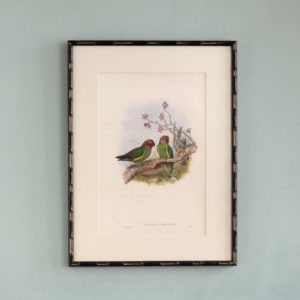
Birds of New Guinea by John Gould,
£220Birds of New Guinea by John Gould,
John Gould (1804-1881) was born in Lyme Regis, Dorset, the son of John Gould, a gardener, and his wife Elizabeth Clatworthy. Gould’s training was as a taxidermist rather than an artist, and in 1828 he was appointed animal preserver at the museum of the Zoological Society of London. In 1838-1840, Gould and his family went to the then relatively unknown continent of Australia, with the purpose of collecting and studying specimens. During his time there he discovered hundreds of new bird species and subspecies. As a result of the findings the fascinating works Birds of Australia and Mammals of Australia were published. Subsequently he was considered as the father of bird study in Australia. Gould himself did not execute finished drawings for any of his works, only providing rough pencil or watercolour sketches with notes for his artists to work from. The artists he employed included his wife Elizabeth, Edward Lear, Joseph Wolf, Henry Richter and Joseph Hart.£220 -
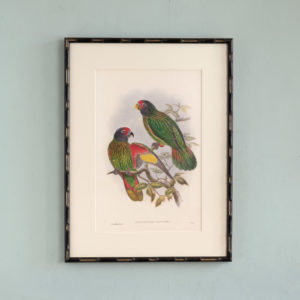
Birds of New Guinea by John Gould,
£220Birds of New Guinea by John Gould,
John Gould (1804-1881) was born in Lyme Regis, Dorset, the son of John Gould, a gardener, and his wife Elizabeth Clatworthy. Gould’s training was as a taxidermist rather than an artist, and in 1828 he was appointed animal preserver at the museum of the Zoological Society of London. In 1838-1840, Gould and his family went to the then relatively unknown continent of Australia, with the purpose of collecting and studying specimens. During his time there he discovered hundreds of new bird species and subspecies. As a result of the findings the fascinating works Birds of Australia and Mammals of Australia were published. Subsequently he was considered as the father of bird study in Australia. Gould himself did not execute finished drawings for any of his works, only providing rough pencil or watercolour sketches with notes for his artists to work from. The artists he employed included his wife Elizabeth, Edward Lear, Joseph Wolf, Henry Richter and Joseph Hart.£220 -
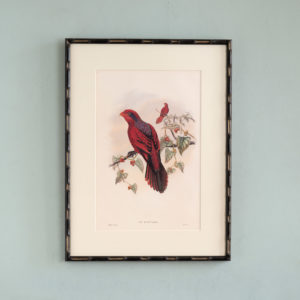
Birds of New Guinea by John Gould,
£220Birds of New Guinea by John Gould,
John Gould (1804-1881) was born in Lyme Regis, Dorset, the son of John Gould, a gardener, and his wife Elizabeth Clatworthy. Gould’s training was as a taxidermist rather than an artist, and in 1828 he was appointed animal preserver at the museum of the Zoological Society of London. In 1838-1840, Gould and his family went to the then relatively unknown continent of Australia, with the purpose of collecting and studying specimens. During his time there he discovered hundreds of new bird species and subspecies. As a result of the findings the fascinating works Birds of Australia and Mammals of Australia were published. Subsequently he was considered as the father of bird study in Australia. Gould himself did not execute finished drawings for any of his works, only providing rough pencil or watercolour sketches with notes for his artists to work from. The artists he employed included his wife Elizabeth, Edward Lear, Joseph Wolf, Henry Richter and Joseph Hart.£220 -
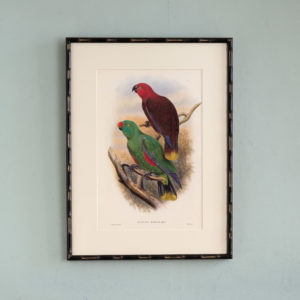
Birds of New Guinea by John Gould,
£220Birds of New Guinea by John Gould,
John Gould (1804-1881) was born in Lyme Regis, Dorset, the son of John Gould, a gardener, and his wife Elizabeth Clatworthy. Gould’s training was as a taxidermist rather than an artist, and in 1828 he was appointed animal preserver at the museum of the Zoological Society of London. In 1838-1840, Gould and his family went to the then relatively unknown continent of Australia, with the purpose of collecting and studying specimens. During his time there he discovered hundreds of new bird species and subspecies. As a result of the findings the fascinating works Birds of Australia and Mammals of Australia were published. Subsequently he was considered as the father of bird study in Australia. Gould himself did not execute finished drawings for any of his works, only providing rough pencil or watercolour sketches with notes for his artists to work from. The artists he employed included his wife Elizabeth, Edward Lear, Joseph Wolf, Henry Richter and Joseph Hart.£220 -
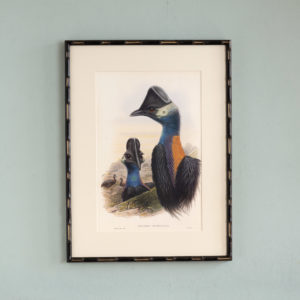
Birds of New Guinea by John Gould ,
£220Birds of New Guinea by John Gould ,
John Gould (1804-1881) was born in Lyme Regis, Dorset, the son of John Gould, a gardener, and his wife Elizabeth Clatworthy. Gould’s training was as a taxidermist rather than an artist, and in 1828 he was appointed animal preserver at the museum of the Zoological Society of London. In 1838-1840, Gould and his family went to the then relatively unknown continent of Australia, with the purpose of collecting and studying specimens. During his time there he discovered hundreds of new bird species and subspecies. As a result of the findings the fascinating works Birds of Australia and Mammals of Australia were published. Subsequently he was considered as the father of bird study in Australia. Gould himself did not execute finished drawings for any of his works, only providing rough pencil or watercolour sketches with notes for his artists to work from. The artists he employed included his wife Elizabeth, Edward Lear, Joseph Wolf, Henry Richter and Joseph Hart.£220 -
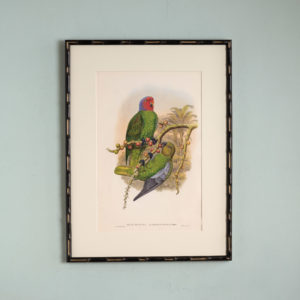
Birds of New Guinea by John Gould
£220Birds of New Guinea by John Gould
John Gould (1804-1881) was born in Lyme Regis, Dorset, the son of John Gould, a gardener, and his wife Elizabeth Clatworthy. Gould’s training was as a taxidermist rather than an artist, and in 1828 he was appointed animal preserver at the museum of the Zoological Society of London. In 1838-1840, Gould and his family went to the then relatively unknown continent of Australia, with the purpose of collecting and studying specimens. During his time there he discovered hundreds of new bird species and subspecies. As a result of the findings the fascinating works Birds of Australia and Mammals of Australia were published. Subsequently he was considered as the father of bird study in Australia. Gould himself did not execute finished drawings for any of his works, only providing rough pencil or watercolour sketches with notes for his artists to work from. The artists he employed included his wife Elizabeth, Edward Lear, Joseph Wolf, Henry Richter and Joseph Hart.£220
Featured Items
-
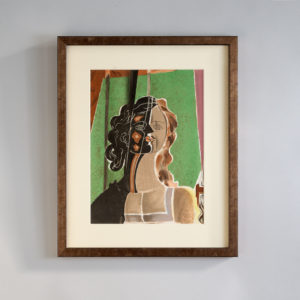
Figure by Georges Braque, Verve Vol 2 / No. 5-6.
£800Figure by Georges Braque, Verve Vol 2 / No. 5-6.
The Verve Review was a purposefully luxurious. It ran from 1937 to 1960, but with only 38 editions available, due to the high degree of design and editorial work dedicated to each issue. Each edition contained unique lithographic prints, commissioned by the editor, and each cover a double-page lithograph elaborated by one of the artists contained within. It was the brainchild of its editor Stratis Eleftheriades, a Greek National who moved to Paris in the early thirties to take part in the growing Modernist movement, writing under the name of Teriade.£800 -
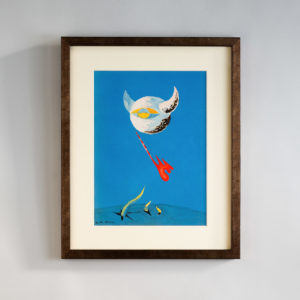
The Moon by André Masson, Verve Vol. 1 / No. 2.
£600The Moon by André Masson, Verve Vol. 1 / No. 2.
The Verve Review was a purposefully luxurious. It ran from 1937 to 1960, but with only 38 editions available, due to the high degree of design and editorial work dedicated to each issue. Each edition contained unique lithographic prints, commissioned by the editor, and each cover a double-page lithograph elaborated by one of the artists contained within. It was the brainchild of its editor Stratis Eleftheriades, a Greek National who moved to Paris in the early thirties to take part in the growing Modernist movement, writing under the name of Teriade.£600 -
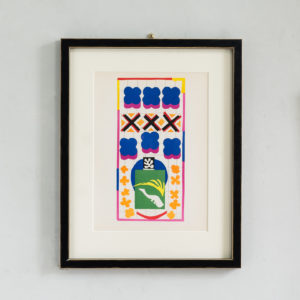
Henri Matisse, ‘The Last Works of Henri Matisse’
£900 eachHenri Matisse, ‘The Last Works of Henri Matisse’
From Verve Vol. IX No. 35/36 published by Tériade under the title 'The Last Works of Henri Matisse'£900 each -
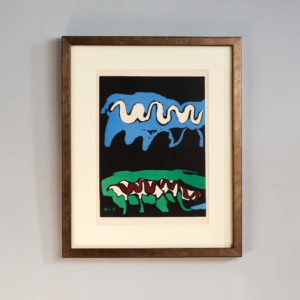
The Four Elements, Earth by Francisco Bores, Verve Vol. 1 / No. 1.
£600The Four Elements, Earth by Francisco Bores, Verve Vol. 1 / No. 1.
The Verve Review was a purposefully luxurious. It ran from 1937 to 1960, but with only 38 editions available, due to the high degree of design and editorial work dedicated to each issue. Each edition contained unique lithographic prints, commissioned by the editor, and each cover a double-page lithograph elaborated by one of the artists contained within. It was the brainchild of its editor Stratis Eleftheriades, a Greek National who moved to Paris in the early thirties to take part in the growing Modernist movement, writing under the name of Teriade.£600
